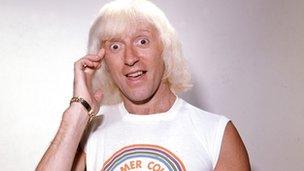Police 'questioned Jimmy Savile' over abuse in 2007
- Published

Surrey police have confirmed that Sir Jimmy Savile was questioned over allegations of child sex abuse in 2007.
In a statement, they said an individual was interviewed over offences which were "alleged to have occurred at a children's home" in the 1970s.
The matter was referred to the Crown Prosecution Service, which "advised there was insufficient evidence to take any further action".
A documentary detailing similar allegations is due to air this week.
The broadcaster, who died last year, is accused of sexual abuse against under-age teenage girls in the ITV1 investigation, to be shown on Wednesday.
Several alleged victims speak on the programme. They say the abuse took place in hospitals, schools and BBC buildings.
In a statement, the BBC said it had found no evidence of abuse taking place on its premises.
"Whilst the BBC condemns any behaviour of the type alleged in the strongest terms, in the absence of evidence of any kind found at the BBC that corroborates the allegations that have been made it is simply not possible for the corporation to take any further action," it added.
Rumours
Sir Jimmy was famous for TV shows like Jim'll Fix It and Top Of The Pops and was at the height of his fame in the 1970s.
Esther Rantzen, who worked as a television presenter at the BBC at the same time as Sir Jimmy, said there were rumours about the star.
Esther Rantzen: "There were always rumours about Jimmy Savile"
The 72-year-old, who appears in the ITV1 documentary, said that after listening to some of the interviews with the alleged victims, she found it "impossible" to keep her neutrality.
"I don't think that any of those young women were inventing or creating a lie for any reason," she told the BBC.
"They didn't seem to me to have any motive or malice. They were sad and their memories were clearly very painful. There wasn't much anger in them, they just wanted to put the record straight."
Sir Jimmy's nephew, Roger Foster, said his family was "disgusted and disappointed" by the programme, adding that he was concerned the allegations could damage the reputation of charities Sir Jimmy raised funds for.
"The guy hasn't been dead for a year yet and they're bringing these stories out.
"It could affect his legacy, his charity work, everything. I'm very sad and disgusted," he said.
But fellow broadcaster Paul Gambaccini said he had been "waiting 30 years" for such stories to come out.
Speaking on ITV1's Daybreak programme, he said newspapers had been primed to run similar stories while Sir Jimmy was alive, but the star had intervened to prevent their publication.
"On [one] occasion, and this cuts to the chase of the whole matter, he was called and he said, 'Well, you could run that story, but if you do there goes the funds that come in to Stoke Mandeville - do you want to be responsible for the drying up of the charity donations?' And they backed down."
Left alone
In the ITV1 documentary, one woman who remains anonymous said she met Sir Jimmy at the BBC in 1969, when she was 15.
She claims he indecently assaulted her "probably dozens of times".
But speaking on ITV1's This Morning, host Phillip Schofield questioned how Savile would have been able to take teenage girls into his BBC dressing room without being disturbed.
"I know the layout of those dressing rooms. I know the way a production team works. I know that you're seldom ever left alone in your dressing room, there's always someone knocking on the door.
"And one of these girls says that it was dozens of times. So if there was a 14-year-old girl who was abused dozens of times, what was she doing in his dressing room, and would no-one have known?"
No charges were ever brought against Sir Jimmy when he was alive and ITV said it had taken into full account the fact he could no longer defend the claims.
It said the documentary is the result of an "in-depth investigation into long-standing allegations of serious and widespread sexual misconduct by Sir Jimmy Savile".
"Because of the very serious nature of the claims made by several interviewees in relation to this, particular care and consideration was of course given to the decision to produce and broadcast this programme," said a spokesperson.
- Published1 October 2012
- Published20 September 2012
- Published1 October 2012